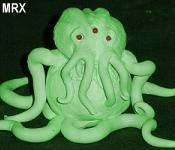So, to try out the new posting format, here is a little snip of a project that is currently in production and almost complete.
I have two copies of Cunningham's Encyclopedia of Magical Herbs, by Scott Cunningham, that were misprinted and unsellable, so I am re-covering them with a custom hard case to showcase some covering and materials options for potential customers who may want me to re-cover their books for them. As the original book was a paperback, it did not have a headband (that little tab of cloth wrapped with colored thread at the top and bottom of the spine). I have no sources for bookbinding materials in my area, and the pre-fabricated headband I found for sale over the internet is a bit expensive, so I decided to make my own.

I started with a technique that I have seen mentioned on several websites and in a few YouTube videos (yes, people actually make YouTube videos about bookbinding techniques, and I thank them for it). I took a piece of black cloth, about 1.5 inches wide by 4 inches long, and coated one side with white glue. Then I laid a piece of black hemp cord (the kind hippies make bracelets out of) and laid it lengthwise across the middle of the strip of cloth, on the glued side. Then I folded the cloth over at the cord, and smoothed it down, using a bone folder to snug up the seal along the edge of the cord.

Now, the websites and videos I saw just leave it there, and I could have too. You just wait for the glue to dry, cut a piece off of the strip to the length needed and glue it into place at the spine of the book before it is cased in. But this time I decided to go the extra mile. I decided to hand wrap the headband in colored thread to make it look nicer and more authentic. I used a forest green embroidery floss, which I had to thin by a few strands, and using a needle, I hand sewed the headband, piercing just below the cord and wrapping the thread around the cord for the length of the strip (or until I ran out of thread). It was basically simple embroidery, just like my mother taught me when I was 7. A little tedious and a little time consuming, but not difficult at all.

After I had sewn as far as I could, making sure my stitches were evenly spaced and tight, I ran a very small bead of superglue along the bottom edge of the embroidery, so that it would not unravel when the headband was cut to length. I think in the future I might try putting a light coat of white glue along the cord edge and wrap/sew the floss over it. That would do a better job, but it might be too messy. I don't want to gum up the floss with glue as I sew.


















No comments:
Post a Comment